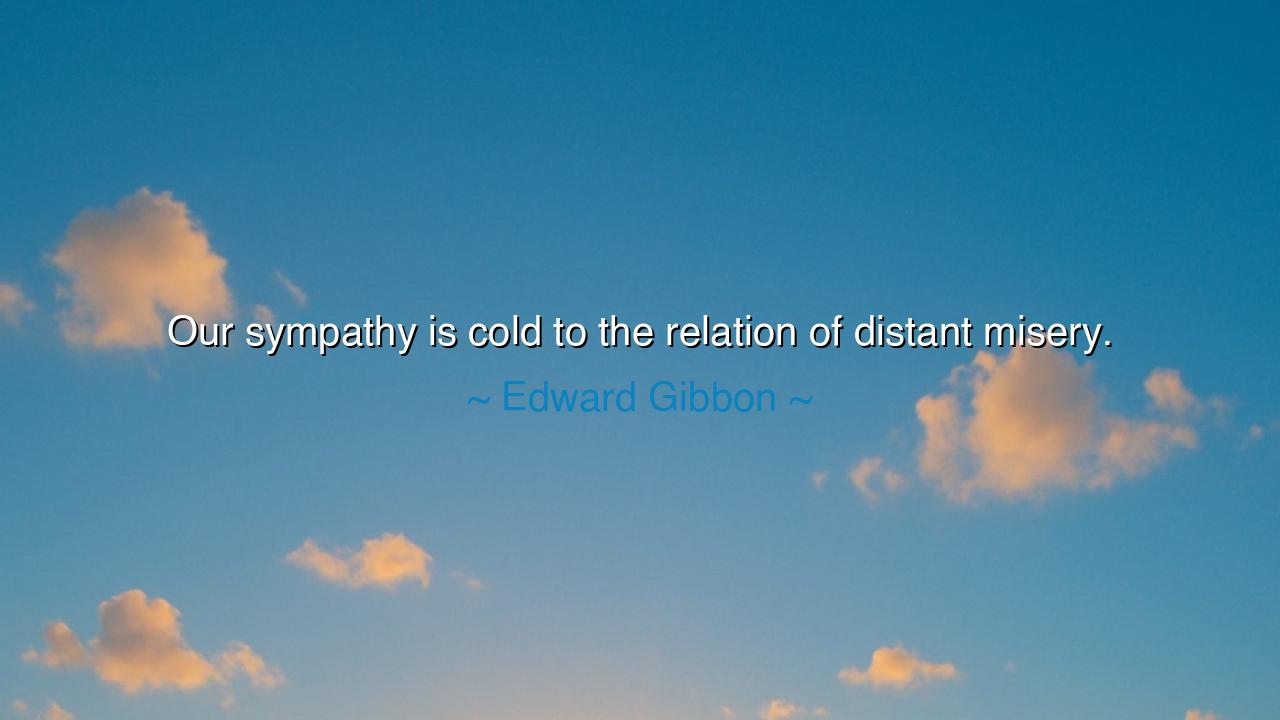
Our sympathy is cold to the relation of distant misery.






Hear the grave words of Edward Gibbon, historian of empires and chronicler of decline: “Our sympathy is cold to the relation of distant misery.” In this stark utterance lies a mirror held up to the human heart. For men and women are quick to weep for the tears they see before them, yet their compassion falters when sorrow lies far away—in distant lands, among foreign tongues, or hidden in the pages of history. The cry of a neighbor pierces the soul, but the cry of the stranger, faint and remote, often fades into silence.
The meaning of this saying is drawn from the frailty of human nature. Our sympathy is strongest when the suffering is near, when the faces are familiar, when the plight is vivid. But when misery is distant—across oceans, in other nations, or in the past—our hearts grow colder. We may acknowledge it, we may nod in thought, but we do not burn with the same urgency to act. Gibbon, who wrote of the Decline and Fall of the Roman Empire, saw this clearly: that the tragedies of the past or of faraway lands often stir the mind but rarely ignite the heart.
Consider the great famine of Ireland in the 19th century. Millions starved or fled, yet many who lived comfortably in England or beyond responded with indifference. Newspapers reported the hunger, the skeletal faces, the countless deaths—but for those who did not see it with their own eyes, compassion was muted. Their sympathy was dulled by distance. Only when famine crossed into their streets, or into their kin, would the fire of mercy truly burn.
History offers another tale in the voyages of explorers. When Magellan’s sailors returned with stories of distant peoples enslaved, starved, or conquered, kings and merchants often shrugged. The misery was too far, the sufferers too foreign. Wealth and discovery outweighed compassion. Here, too, Gibbon’s words hold true: for distant pain is easily dismissed when profit or comfort stand closer at hand.
Yet the truth of this saying is not meant as condemnation alone—it is a warning. If our sympathy grows cold with distance, then it is the duty of the wise to warm it deliberately. For the bonds of humanity stretch farther than our sight. The Roman Empire fell in part because men ceased to care for one another across its vast dominion; the center hardened while the provinces suffered. The empire’s weakness lay not only in armies, but in compassion grown cold.
The lesson for us is clear: train your heart to feel beyond your sight. When you hear of distant misery—in another land, another people, another time—do not dismiss it as “not mine.” For their pain is the mirror of your own; their suffering is kin to yours. To cultivate compassion for the far and the foreign is to strengthen the chain of humanity. To ignore it is to narrow the soul until only the self remains.
So, children of tomorrow, remember this: sympathy is a flame that must be tended, lest distance and indifference extinguish it. When misery is distant, draw it near in thought; imagine the faces, the cries, the humanity behind the words. For though Gibbon spoke of coldness, you may answer with warmth. And in choosing to care not only for the neighbor but also for the stranger, you preserve not only your own heart, but the very bonds that hold civilizations together.






AAdministratorAdministrator
Welcome, honored guests. Please leave a comment, we will respond soon